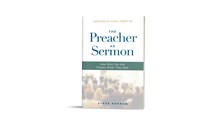
Chapter 41
The Intentional Bridge Builder
Seven principles for crossing gaps to connect with others.
All of us who preach are involved in cross-cultural communication. We preach to youth shaped by postmodern culture. We cross the bridge to preach to Asian Americans, Latinos, African Americans, Native Americans, Whites, and internationals. We speak across gender lines. The diversity may be so slight that we haven't noticed it before, but it is real. We may also have opportunities to go on short term missions projects where we will preach cross culturally. As a result, cross-cultural skills and attitudes are becoming more crucial for preaching. Here are seven principles that have helped me to preach to people of different cultures.
Honor what they honor
Do your hearers honor time or event? If they care about punctuality, be on time. If they are laid back about the clock, relax. The occasion is what matters, not the time it starts or how long it lasts.
Are they relational or task-oriented? For some cultures the process is at least as important as the agenda. In another, the objective rules. African American culture is relational, expressive, event-oriented, and ascribes honor. So hang out and express your feelings about things.
Do they ascribe honor because of title and prestige, or is honor achieved by accomplishment and experience? Youth don't care about titles, so credibility is built by sharing your experiences with them. African American culture reveres the pastor and respects titles. That means that when you begin to speak, if you are a guest, you should thank and honor their pastor and leaders. Recognize that as a preacher you will be honored by virtue of your position before you ever say a word.
What do they consider sacred? Something you normally regard as incidental or trivial could be of extreme importance. You might not even be aware that you are being rude. Asian American culture is very honor-and shame-oriented, and honoring elders is crucial. For example, in a sermon I might tell how I've learned a valuable life lesson from my grandparents.
What behavior or dress might offend them? Dress up to speak in a casual culture, and you create a barrier. Dress down, and in many African American contexts, people will spend 90 percent of the time thinking about why you look like you do.
How do they feel about women in ministry? This is pertinent whether or not you are a woman. Don't assume they share your convictions.
Use their heart language whenever you can, but do so with authenticity
The heart language of Native Americans is the language of spiritual experience and of harmony in relationships and nature. Hispanic culture is family-oriented. Talking about your background, your family and children, speaks to their hearts. "Heart" is communicated in the language itself. I don't know much Spanish, but I use what I can when visiting my friend Pedro Aviles's church.
When I speak to youth, I try to use a little slang and refer to a hip-hop artist, even though I am not fluent in that culture. Music is the heart language of young people today. Referencing their music shows you are trying to understand their world. A quote from Eminem or 50 Cent can go a long way, especially if you admit your limitations.
Genuineness matters most. I might say, "I'm not the world's most knowledgeable fan of hip-hop, but these lines grabbed my attention" People can smell it when you try to speak their language, and it is inauthentic, but they appreciate even a faltering effort to build the bridge.
Communicate your awareness of the trust issues between your cultures
Jimmy McGee, an African American leader with Intervarsity, told me this detail about America's history of oppression. For 300 years, Africans were brought over on slave ships through what was called the Middle Passage. Millions died on the way, their bodies were thrown overboard, and sharks began following the ships. To this day, sharks travel the Middle passage, because that was their feeding route for 300 years.
Christians were involved in rationalizing and manipulating Scripture to support the horrors of slavery. As a white person, when I preach in a Black context, the baggage from all that evil lingers. I have to show I am aware of that, or I cannot be trusted.
Native Americans experienced genocide at the hands of Whites. As a result, only 6 percent of contemporary Native Americans are Christian. The trust issues are immense, and only people willing to recognize the evils of the past can even be heard.
Postmoderns mistrust anyone who believes they know the truth and that everyone else is wrong. This makes preaching to postmoderns a cross-cultural experience.
Recently at Einstein Bagels, which I frequent, a clerk asked me, "Rick, you're not one of those people who believe Jesus is the only way, are you?" The way he said it, I knew he viewed those who proclaim Jesus as the only way on the level of the 9/11 terrorists. So I said, "Sam, it sounds like you've been hurt by people who excluded you and dismissed you for what you believed." He said, "You're right!" I said, "I'm sorry that happened to you. I hate it when people exclude and dismiss me because of what I believe. That's why it was so surprising for me when I was drawn to some of the unique elements of Christianity."
Similarly, in a sermon, I acknowledge where the bridge is broken before I try to cross it. I identify with people's fears. I talk about how uncomfortable I am with people who reject others. Then I talk about the hope and love that Christ gives.
Become a great storyteller and a narrative theologian
Propositions may not translate between cultures, but stories about life, family, and struggles almost always do. Narratives make us feel we can relate to each other. Through storytelling we share pain, apply truth, and build trust. We must become fluent in the universal language of story if we want to preach cross-culturally.
Start with stories of experiences with people from the host culture. Share stories of your attempts to learn their culture, as well as stories that recognize the trust issues.
Turn your principles and statements of propositional ideas into illustrations and stories. Tell the stories Jesus told. When you can, choose narrative passages from the Scriptures. Close with stories that challenge people to appropriate the truths you are communicating.
Do what you came to do
After building trust and rapport, don't hold back. Fulfill your calling and speak the truth. The fact that you are from a different culture often gives you tremendous opportunity to challenge people in extraordinary ways. Build the bridge and then walk across it! Billy Graham is great at building trust, but he also knows why he's there and what he came to say, and he always says it.
Since you have identified and built trust, you can now give the gift of your cultural practices and your insights. If your culture does altar calls, do them. If your culture challenges people to reflection and thought, do that. People will likely recognize the style of your culture and affirm it.
Avoid judging their response by your own cultural cues
A group may be with you and not show it in the ways you recognize. When I preach to Asian Presbyterians, who tend to be respectful and quiet, I sometimes wonder if anything I said connected. I need to listen carefully to comments afterward and look for affirmation that goes beyond courtesy to know what happened. When I speak in African American contexts, I have to be ready to amp it up when they respond. There is a call-and-response that is part of the rhythm of the culture. It's fun, and I must learn to work with it and not ignore it.
What's more, cultural tendencies are only tendencies. We will always find people who don't fit those tendencies at all. We can't make assumptions about individuals based on broader cultural characteristics.
Be a curious, lifelong learner and observer, and cultivate cultural "informants"
My friend Brenda Salter McNeil is a world class, cross cultural preacher and has shared her expertise with me generously. When she preaches in Black contexts, she honors every single person who had anything to do with bringing her there or who is an important leader for that community. Brenda helped me understand that dynamic and respond appropriately.
Find women to help you understand whether you are connecting with women. Find informants among youth who can help you know if you are connecting with youth.
Be immensely curious about other people groups. If you want to preach cross-culturally, you are committing to a long-term adventure that will humble and enrich you.










